Scientific papers 2020

Authors:
Richard V. Lundell, Anne K. Räisänen-Sokolowski, Tomi K.
Wuorimaa, Tommi Ojanen, & Tommi Ojanen.
Diving close to the Arctic circle means diving in cold
water regardless of the time of year. The human body
reacts to cold through the autonomous nervous system
(ANS)-mediated thermoregulatory mechanisms. Diving
also induces ANS responses as a result of the diving reflex.
To study ANS responses during diving in Arctic water
temperatures, the authors retrospectively analyzed
repeated 5-min heart rate variability (HRV) measures and
the mean body temperature from dives at regular
intervals using naval diving equipment measurement tests
in 0 degrees C water.


Authors:
Ben Aviner, Ran Arieli, Alexandra Yalov.
Patients undergoing hyperbaric oxygen therapy and
divers engaged in an underwater activity are at risk of
central nervous system oxygen toxicity. An algorithm for
predicting CNS oxygen toxicity during active underwater
diving has been published previously, but not for humans
at rest. Using a procedure similar to that employed for the
derivation of their active diving algorithm, the authors
collected data for exposures at rest, in which subjects
breathed hyperbaric oxygen while immersed in
thermoneutral water at 33 degrees C or in dry conditions.
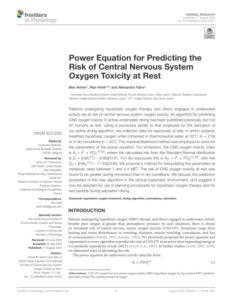

Authors: Marko Žarak, Antonija Perovic, Marina Njire
Braticevic, Sandra Šupraha Goreta, Jerka Dumic.
It has been shown that one diving session is sufficient to
cause changes in plasma level of cardiovascular (CV) and
muscular biomarkers.
To explore whether repetitive diving triggers an adaptive
response of the CV, muscular, and immune system, the
authors measured the cardiac damage, muscle damage,
vascular endothelial activation, and inflammatory,
biomarkers. A longitudinal intervention study included
divers (N = 14) who conducted one dive per week over 5
weeks at the depth of 20–30 m for 30 min after a non-
dive period of 5 months. Blood samples were collected
before and after the first, third, and fifth dives and specific
biomarkers were measured in plasma or serum by the
standard laboratory methods.


Author: Tahreem Fatima
This article does not speak of diving but on the use of
Hyperbaric oxygen therapy (HBOT) as a primary
emergency treatment in some acute pathologies or
alternative therapies, particularly in deep and chronic
infections such as necrotizing fasciitis, osteomyelitis,
chronic
soft tissue infections, and infective endocarditis for chronic
long-term pathologies.
Teams equipped with chambers should be informed that
they can be used in case of such pathologies are found
on the worksite.






Authors:
Bobby Glenn Warren, Jason Masker, Gregory Brown,
Isabella Gamez, Becky Smith, Deverick J. Anderson, and
Nicholas Turner
This study evaluates the efficacy of 2 UV-C devices for
disinfection of surfaces contaminated with
epidemiologically important pathogens (EIPs) in
hyperbaric chambers of varying shapes.


Authors:
Juan C Dapena, Corine A Lansdorp, Simon J Mitchell
The authors present the history and imaging of a diver
diagnosed with DCS treated with two US Navy Treatment
Table 6 recompressions but still had multiple extravascular
bubbles apparent on CT-imaging after these hyperbaric
treatments. Based on these findings, they hypothesize that,
contrary to general belief, it is possible that large
extravascular bubbles can persist after definitive treatment
for DCS.


Authors:
Francisco de Asís-Fernández, Tamara del Corral, Ibai
López-de-Uralde-Villanueva
After a maximal apnea, breath-hold divers must restore
O2 levels and clear CO2 and lactic acid produced.
High intensity interval training (HIIT) and inspiratory
muscle training (IMT) could be employed with the aim of
increasing recovery capacity. This study aimed to evaluate
the relative effects of IMT versus HIIT on recovery of
peripheral oxygen saturation (SpO2), and also on
pulmonary function, inspiratory muscle strength, lactate
and heart rate recovery after a maximal dynamic apnea in
breath-hold divers.


Authors:
Peter Germonpré, Paul Van der Eecken, Elke Van
Renterghem, Faye-Lisa Germonpré, Costantino Balestra.
The Azoth Systems O’Dive bubble monitor is marketed at
recreational and professional divers as a tool to improve
personal diving decompression safety. We report the use
of this tool during a l2-day dive trip aboard a liveaboard.
Six divers were consistently monitored according to the
user manual of the O’Dive system. Data were
synchronised with the Azoth server whenever possible
(depending on cell phone data signal). Information
regarding ease of use, diver acceptance and influence on
dive behaviour were recorded.


Authors:
Adam E Howard, Peter Buzzacott, Ian C Gawthrope, Neil
D Banham
Middle ear barotrauma (MEBt) is a common side effect of
hyperbaric oxygen treatment (HBOT) and can result in
pain, hearing loss, tinnitus, and otorrhagia. The use of
antiplatelet/anticoagulant drugs is thought to increase the
risk and severity of MEBt during HBOT.
The authors studied all patients treated with HBOT over
four years (between 01 January 2015 to 31 December
2018), looking at the incidence of MEBt and the
concurrent use of antiplatelet and/or anticoagulant drugs.
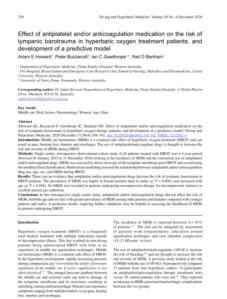

Authors:
Wen-tao Meng, Long Qing, Quan Zhou, Wei-gang Xu
The lung is among the primary organs involved in
decompression sickness (DCS). Xuebijing (XBJ), a
traditional Chinese medicine, has been widely used in the
treatment of various acute lung diseases. This study aimed
to explore potential benefit of XBJ on lung injuries induced
by DCS in a rabbit model.


Authors:
Moritz F Meyer, Kristijana Knezic, Stefanie Jansen, Heinz D
Klünter, Eberhard D Pracht, Maria Grosheva
During descent in freediving there is exposure to rapidly
increasing pressure. Inability to quickly equalise middle ear
pressure may cause trauma to the ear. This study aimed to
evaluate the occurrence of pressure-related damage to
the middle ear and the Eustachian tube during freediving
and to identify possible risk factors.
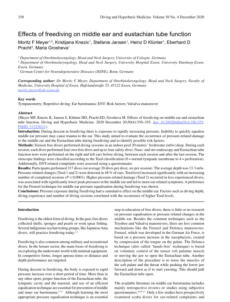

Authors:
Daniel Popa, Anthony Medak, Walter Chin, Oswaldo
Huchim-Lara, 2 scientists, Tudor Hughes, Ian Grover.
Artisanal diving fishermen in Yucatan, Mexico have high
rates of decompression sickness as a result of frequently
unsafe diving practices with surface supplied compressed
air. In this study, the authors investigated the prevalence of
dysbaric osteonecrosis (DON), a type of avascular necrosis,
in the most susceptible joints in a cohort of these
fishermen.
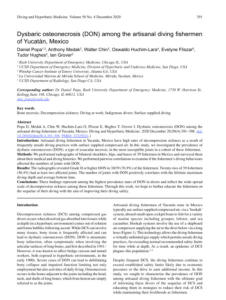

Authors:
Christopher W Scarff, John Lippmann, Andrew W Fock
The presence of a persistent (patent) foramen ovale (PFO)
increases the risk of decompression sickness (DCS) whilst
diving with pressurised air. After the diagnosis of a PEO,
divers will be offered a number of options for risk
mitigation.
The aim of this study was to review the management
choices and modifications to diving practices following
PFO diagnosis in the era preceding the 2015 joint
position statement (JPS) on PEO and diving.
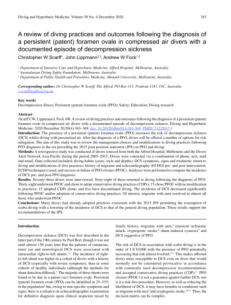

Author:
Charles H Van Wijk, Jarred H Martin, Nazneen Firfi rey
Breath-ho
A recent article reported on common mental health
conditions among recreational scuba divers, and observed
that the prevalence mirrored national population figures.
That raised the question of the extent to which this might
also be the case among professional divers. No data on
commercial divers could be located; this paper presents
the situation among navy divers.


Authors:
Xavier CE Vrijdag, Hanna van Waart, Jamie W Sleigh,
Costantino Balestra, Simon J Mitchell
Critical flicker fusion frequency (CFFF) has been used in
various studies to measure the cognitive effects of gas
mixtures at depth, sometimes with conflicting or
apparently paradoxical results. This study aimed to
evaluate a novel automatic CFFF method and investigate
whether CFFF can be used to monitor gas-induced
nareosis in divers.


Authors:
Babak Hajhosseini, Britta A. Kuehlmann, Clark A. Bonham,
Kathryn J. Kamperman, Geoffrey C. Gurtner
As suggested in the title, this document reviews the
various technics used for Hyperbaric Oxygen therapy. It
can be used as a complementary source of information
regarding the positive use of hyperbaric oxygen.


Author: Richard Clarke
This paper summarises the history and capabilities of
monoplace chambers in treatment of decompression
illness (DCI); both in support of diving operations and in
the hospital setting. In the field, monoplace hyperbaric
chambers provide victims of DCI immediate access to
recompression in settings where traditional multiplace
chambers are not available.

Authors: Simona Mrakic-Sposta, Alessandra Vezzoli,
Federica D’Alessandro, Matteo Paganini, Cinzia
Dellanoce, Danilo Cialoni, and Gerardo Bosco
This study investigated the effects of saturation diving on
oxidative stress damage. Four divers were included in the
study. After the saturation dive (post), significant increases
in reactive oxygen species (ROS), total antioxidant capacity
(TAC), total antioxidant capacity (TAC), and nitric oxide
metabolites (NOx) were detected.
The authors say that these results could ameliorate
commercial or military diving protocols or improve the
understanding of symptoms caused by oxygen level
elevation.


Authors: Ran Arieli, and Ben Aviner
This short article confirms that there is a process of
acclimatization and possibly deacclimatization to oxygen,
which makes it necessary to review the safe exposure
limits. It can be seen as a part and the continuation of
previous works undertaken by doctors Ran Arieli and Ben
Aviner regarding oxygen toxicity.
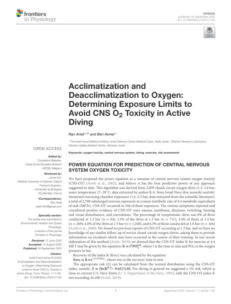


Authors: Brian T Andrew, David J Doolette
The US Navy air decompression table was promulgated in
2008, and a revised version, calculated with the VVal-79
Thalmann algorithm, was promulgated in 2016. The
Swedish Armed Forces conducted a laboratory dive trial
using the 2008 air decompression table and 32 dives to
40 metres‘ seawater for 20 minutes bottom time resulted
in two cases of decompression sickness (DCS) and high
venous gas emboli (VGE) grades. These results motivated
an examination of current US Navy air decompression
schedules.


Authors: Andrzej Molisz,Tomasz Przewozny,Katarzyna
Nowicka-Sauer, Marta Sauer
The role of the cardiovascular system in the development
of seasickness remains uncertain. Material and Methods:
Overall, 18 healthy students (10 males and 8 females)
aged 18–24 years volunteered in the project, spending
2–7 h on life rafts. The cardiovascular system was
examined with impedance cardiography. Susceptibility
and symptoms of seasickness were evaluated by the
Motion Sickness Susceptibility Questionnaire Short-form
(MSSQ-Short) and the Motion Sickness Assessment
Questionnaire (MSAQ). The Visual Analogue Scale (VAS),
ranging 0–10, was used to assess nausea, dizziness and
mood. The parameters were assessed at 2 time points.


Authors: Kåre Segadal, Andreas Møllerløkken
This study was done on initiative from PSA. The objective
was to investigate emergency decompression as an
alternative, in cases where the evacuation from a
saturation facility of divers at increased pressure, is not
available for whatever reason. It is stressed that it will not
be the purpose of such procedures to prevent pain or
discomfort, but to prevent serious injury and death.


Authors:
Brunon Kierznikowicz, Władysław Wolański, Romuald
Olszanski
The article describes a diver performing a dive at small
depths in a dry suit, breathing from a single-stage
apparatus placed on his back. As a result of training
deficiencies, the diver began breathing from inside the
suit, which led to hypoxia and subsequent uncontrolled
ascent. Upon returning to the surface, the diver
developed neurological symptoms based on which a
diagnosis of pulmonary barotrauma was made.
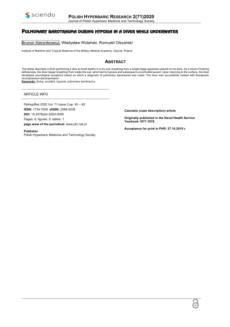

Authors:
Jakub Tlapák, Boris Onišcenko, Petr Došel, Pavel Požár, Petr
Chmátal, and Michal Hájek
Pneumothorax as a consequence of pulmonary
barotrauma during explosive decompression military
crew training in a hypobaric chamber is an extremely rare
and sparsely diagnosed complication. Extensive bilateral
tissue damage is even more unexpected.
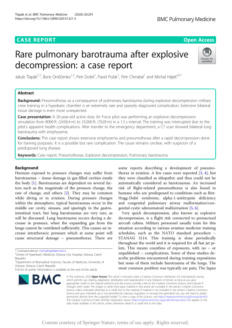

Authors:
Xavier CE Vrijdag, Hanna van Waart, Jamie W Sleigh,
Simon J Mitchell
Gas narcosis impairs divers when diving deeper.
Pupillometry is sensitive to alcohol intoxication and it has
been used in anaesthesia to assess nitrous oxide narcosis.
It is a potential novel method to quantify narcosis in
diving. The aim of this study was to evaluate pupillometry
for objective measurement of narcosis during exposure to
hyperbaric air or nitrous oxide.


Authors:
Patrick J. Kirkland, Dana Mathew, Pranav Modi, & Jeffrey S.
Cooper
Nitrogen narcosis is a change in consciousness,
neuromuscular function, and behavior brought on by
breathing compressed inert gasses. It has also been called
depth intoxication, ”narks,” and rapture of the deep.
Traditionally the gas involved in narcosis is nitrogen, and it
is associated with dysfunction when breathed by scuba
divers from their tanks containing compressed air. Other
inert gasses associated with narcosis include neon, argon,
krypton, and xenon, with the latter having an anesthetic
effect even at sea level. Interestingly, helium does not
cause inert gas narcosis and therefore, is used in deep
diving as heliox.


Authors: Aida Carballo-Fazanes, Joost J.L.M. Bierens, and
the International Expert Group to Study
Drowning Behaviour
Although drowning is a common phenomenon, the
behaviour of drowning persons is poorly understood.
The purpose of this study is to provide a quantitative and
qualitative analysis of this behaviour. This was an
observational study of drowning videos observed by 20
international experts in the field of water safety. For
quantitative analysis, each video was analysed with Lince
observation software by four participants. A Nominal
Group Technique generated input for the qualitative
analysis and the two principal investigators conducted a
post-hoc analysis.
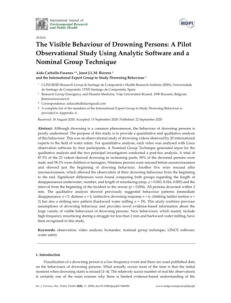

Authors: Ewa Manka, Bartosz Skuratowicz, Sebastian
Kwiatek, Maciej Krupowies, Karolina Sieron
Due to the high prevalence of diabetes mellitus in the
world population and the potential for dangerous
complications during diving, there is a need for unified
recommendations for safe diving with this condition.
Current guidelines from international diving associations
are not entirely consistent. This review presents the
positions of international diving associations concerning
the requirements for diving with diabetes, the scope of
diving and recommended management of life-threatening
conditions during the dive.



Authors:
Sergey S. Petrikov, Anatoly K. Evseev, Olga A. Levina, Aslan
K. Shabanov, Vladimir V. Kulabukhov, Natalia Yu.
Kutrovskaya, Natalia V. Borovkova, Elena V. Klychnikova,
Irina V. Goroncharovskaya, Elizaveta V. Tazina, Konstantin
A. Popugaev, Denis A. Kosolapov, Daria S. Slobodeniuk
Patients diagnosed with new coronavirus infection caused
by SARS-CoV-2 virus were examined. Hyperbaric oxygen
therapy sessions were conducted on 57 patients, 38 in
severe condition (CT 3–4) and 19 in moderate condition
(CT 1–2). The procedures were performed in the 1.4–1.6
ATA mode for 40 minutes, 247 sessions were performed.
The effect of hyperbaric oxygenation was assessed by
measuring the level of oxygen saturation, the severity of
oxidative stress, and the apoptosis of blood lymphocytes.
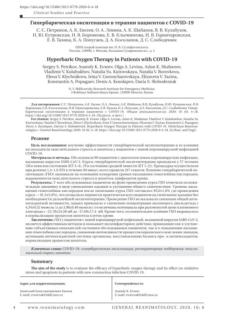

Authors: Maja Schlittler, Hannes Gatterer, Rachel Turner,
Ivo B. Regli, Simon Woyke, Giacomo Strapazzon,
Peter Rasmussen, Michael Kob, Thomas Mueller,
Jens P. Goetze, Marc Maillard, Gerrit van Hall, Eric
Feraille, and Christoph Siebenmann
The authors investigated the effect of hypobaric hypoxia
(HH) on plasma volume (PV) in a crossover study that
strictly controlled for diet, water intake, physical activity,
and temperature.
Eleven males completed two 4-day sojourns in a
hypobaric chamber, one in normoxia (NX) and one in
hypobaric hypoxia (HH) equivalent to 3500 m altitude.


Click on the octopus
to return to the top
of the page



Author: Amy Elizabeth King
This paper focuses on decompression sickness (DCS)
resulting from hyperbaric exposure, specifically,
underwater diving. The US Navy uses probabilistic
decompression models to gain insight into the level of risk
posed by a particular time-depth profile. These models
quantify the probability of DCS occurring using survival
analysis and a gas content or bubble volume model to
define the risk. Current probabilistic models make a
binomial prediction of the probability of DCS occurring
and not occurring.
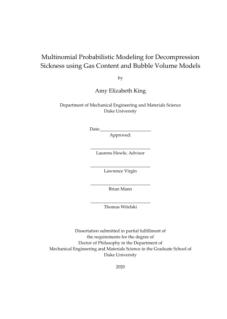
Authors: Stecia-Marie P. Fletcher, Natalia Ogrodnik, and
Meaghan A. O’Reilly
The authors developed a short-burst, phase-locked
focused ultrasound to address standing waves in the
human spinal canal. They demonstrated that microbubble
emissions from these pulses can effectively open the
blood-spinal cord barrier,which can be detected through
the human vertebral arch.Using a dual aperture approach
and pulse inversion (PI) at 514 kHz, the authors sonicated
circulating microbubbles through ex vivo human
vertebrae.



Authors: Mary Mallappallil, Jacob Sabu, Angelika
Gruessner, and Moro Salifu
Big data refers to extensive datasets that traditional
software cannot handle. The medical field is likely to use it
more in various sectors, including business, academia,
government, and public areas. This includes all sorts of
health data, such as biobanks, wellness devices, medical
records, demographics, and images. Big data is also
changing research methods. Due to more affordable
computing, it is easier to gather massive amounts of data,
use biobanks, design more adaptable studies, and boost
teamwork across different sectors.


Authors: Amy E. King, Laurens E. Howle
This work focuses on hyperbaric exposure, particularly
decompression sickness (DCS) resulting from diving. The
signs and symptoms of DCS can range from mild rashes
and joint pain to severe neurological and cardiac
dysfunction, and even death. In this paper, a probabilistic
model for predicting the tetranomial outcomes of severe,
mild, marginal, and no DCS, was analyzed and compared
with the trinomial and trinomial marginal models from a
previous paper.


Authors: Huseyin Karakaya, Serkan Aksu, Salih Murat Egi,
Salih Aydin, Atilla Uslu
The authors investigated the cognitive effects of simulated
air environments (500 kPa) on recreational scuba divers.
It was observed that nitrogen narcosis at a pressure of
500 kPa in a dry hyperbaric chamber had a mild to
moderate negative effect on the cognitive performance of
recreational air divers, which threatens the safety of
diving. Although relatively reduced, this effect persisted in
post-dive sessions. These adverse effects are significant for
open water divers. The results have important implications
for preventing nitrogen narcosis and diving accidents at
depths of up to 40 msw.
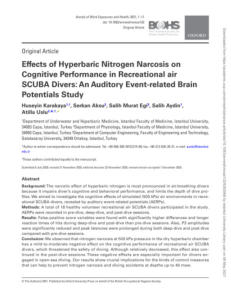

Authors: Andreas Fichtner, Anne Münch, Denise Preuss,
Thomas Pohl, Thomas Grab, Tobias Fieback,
Thea Koch
Audio Doppler bubble measurements for estimating
supersaturation are typically performed in specialized
professional environments and are not accessible to the
wider community of recreational divers. However, the
authors believe that if recreational divers, regardless of
their medical and ultrasound training background, could
master audio Doppler self-assessment to reliably grade
bubbles with a single effective training session, this skill
could greatly improve diving safety.




Authors: Qiang Yao, Feng Xu, and Jiabao Lin
This document is a qualitative research study on pre-
performance routines (PPRs) specific to elite Chinese
athletes in competitive diving. It identifies and categorizes
the components and stages of PPRs in diving, providing a
comprehensive understanding of the psychological and
behavioral patterns involved. It informs the development
of PPRs for diving athletes and suggests directions for
future research on PPRs in other sports.


Authors: Ke Ning, Zhen-biao Guan, Hong-tao Lu, Ning
Zhang, Xue-jun Sun, Wen-wu Liu
This study establishes a model of decompression-induced
lung injury (DILI) secondary to repetitive diving in mice,
explores the role of macrophages in DILI, and investigates
the protective effects of high-concentration hydrogen
(HCH) on DILI. It divided mice into three groups (control,
DILI, and HCH), subjecting them to hyperbaric air
exposure followed by decompression and then
administering HCH to one group. Various tests and
analyses of lung function, inflammatory responses, and
macrophage activity have been conducted, concluding
that repetitive diving causes lung damage and
inflammation, which can be mitigated by HCH inhalation.


Author: Oliwia Pinkowska
This document presents a literature review on the risk
factors associated with decompression sickness (DCS) in
recreational scuba diving. It outlines the methodology
used to gather relevant studies, summarizes the findings
regarding various risk factors, and concludes with the
need for further research to clarify the roles of gender and
fat mass in the development of DCS symptoms.


Author: Abdullah Arjomand, James R. Holm, and Anthony
J. Gerbino
This report analyzes a severe case of decompression
sickness (DCS) in a diver, which was complicated by shock
and respiratory failure. It describes the case's clinical
presentation, treatment, and outcomes, highlighting the
pathophysiology and the need for specific medical
interventions such as aggressive fluid resuscitation and
hyperbaric oxygen therapy. It also underscores the
importance of considering hyperbaric oxygen treatment
even in critically ill patients with DCS.


Authors: Kaiming Liu, Brian Z. Wang, Yishu Hao, Shuijiang
Song, & Mengxiong Pan
This document summarizes and analyzes the relationship
between migraine and patent foramen ovale (PFO),
including potential pathophysiological mechanisms,
clinical features, and the effects of PFO closure on
migraine attacks. It highlights the need for further research
to clarify the causal relationship and optimize patient
selection and treatment strategies.


This text informs and cautions about the challenges and
risks associated with recreational diving during the COVID-
19 pandemic. It highlights the impact of global preventive
measures on healthcare resources, the difficulties in
maintaining safety protocols during diving, and the
potential risks of diving-related illnesses that may be
exacerbated by the current scarcity of medical resources
and hyperbaric chambers, in addition to raise awareness
about the complications and necessary precautions for
diving activities in the context of the pandemic.


Authors: Johnny Conkin, Ph.D.
This document intends to present research findings and
methodologies related to decompression sickness (DCS)
and venous gas emboli (VGE) in the context of hypobaric
decompressions, particularly for astronauts. It aims to
explain the probabilistic nature of DCS, describe the
methods used to model and predict the occurrence of
DCS and VGE and discuss the implications of these
models for planning extravehicular activities (EVAs) in
space exploration.


Authors: Gianluca Di Muro, F. Gregory Murphy, Richard D.
Vann, Laurens E. Howle
This research focused on developing and evaluating
interconnected tissue compartmental models for
predicting decompression sickness (DCS) in compressed
gas diving, outlining the extension of previous models to
include multiple risk-bearing compartments and discussing
the training and evaluation of these models using a large
dataset. The report also highlights the exploration of
model performance, particularly in predicting DCS in
humans for dives outside the training set, and identifies
the most successful model configuration.


Author: Ryszard Kłos
This document provides information about applying and
evaluating a sonography technique, specifically the
Doppler method, for detecting the free gas phase in
intravascular settings related to decompression research. It
discusses the methodological approach, including the use
of Bayesian validation, and highlights the differing
opinions on the effectiveness of this method in predicting
decompression risk. It also provides historical context on
how this technique has been adopted and developed by
various countries, particularly by the Polish Naval
Academy, which has been using it for over 25 years.


Authors: Eduardo García, Simon J Mitchell
This document presents a scientific study on the
pathophysiology of cutaneous decompression sickness
(DCS), specifically cutis marmorata, in divers. It aims to
share findings from an investigation that used ultrasound
and echocardiography to examine the presence of
bubbles in the skin and the potential role of a right-to-left
shunt (RLS) in the condition. It also discusses hypotheses
about the formation and movement of bubbles in the skin
and suggests that ultrasound can be helpful for further
research in this area.


Author:
Charlotte Sadler, Miguel Alvarez Villela, Karen Van Hoesen,
Ian Grover, Michael Lang, Tom Neuman, Peter Lindholm
The information report provides guidelines for evaluating
scuba divers' fitness to return to diving after a COVID-19
infection. It highlights the unique physiological challenges
of scuba diving, the potential long-term effects of COVID-
19 on pulmonary and cardiac health, and the need for
medical evaluations based on the best available evidence
and past experiences with similar illnesses.
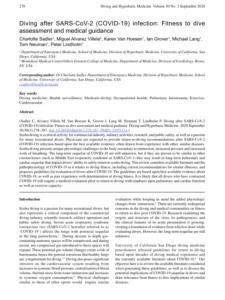

Author: Arina B. Favilla and Daniel P. Costa
This document reviews and synthesizes current scientific
understanding of the thermoregulatory strategies
employed by marine air-breathing vertebrates during
diving to highlight the challenges these animals face due
to the thermal conductivity of water and the physiological
demands of diving, such as maintaining thermal balance.
It also seeks to encourage further research in this area,
mainly through physiological biologgers, to better
understand how these animals manage conflicting
physiological demands to maintain homeostasis.


Author: Kubra Ozgok-Kangal , Kubra Canarslan-Demır,
Taylan Zaman , Kemal Sımsek
This study analyzes the long-term effects of occupational
diving on pulmonary functions to investigate how factors
such as diving experience, smoking history, and
occupational groups (commercial divers and SCUBA
instructors) impact respiratory health. It outlines the
methodology, results, and conclusions of the research,
highlighting that long-term diving experience is associated
with changes in pulmonary function test parameters,
specifically related to small airway obstruction, while
smoking and occupational groups do not significantly
influence these parameters.


Authors: Ran Arieli, Soliman Khatib, Aatef Khattib, Elena
Bukovetzky, Orna Dally Gottfried
This document introduces a scientific hypothesis
regarding the potential role of lung surfactant
dipalmitoylphosphatidylcholine (DPPC) in the
development of autoimmune diseases, particularly type 1
diabetes. It outlines a proposed mechanism by which
DPPC may contribute to autoimmune responses and
suggests that further investigation into this hypothesis
could lead to new therapeutic opportunities and includes
preliminary findings from a study comparing DPPC levels
in diabetic patients and control subjects, indicating a
potential link between DPPC levels and the onset of type 1
diabetes.


Authors: Arnau Carreño, Mireia Gascon, Cristina Vert, and
Josep Lloret
This study evaluates the effects of scuba diving on mental
health, particularly in comparison to beach activities, to
highlight the potential mental health benefits of scuba
diving and beach activities, especially for individuals with
chronic or psychiatric illnesses who are on regular
medication. Additionally, it discusses the environmental
impacts of scuba diving practices and the methodology
used to assess mental health outcomes.


Authors: Catherine Ashton, Neil Banham, Merrilee
Needham
This paper presents a medical study on spinal cord
infarction (SCI), discussing its causes, diagnosis, and
potential treatments to share findings from a review of
cases at Fiona Stanley Hospital, highlighting the outcomes
of different treatment approaches, particularly the use of
hyperbaric oxygen treatment (HBOT), pentoxifylline, and
cerebrospinal fluid (CSF) drainage. The conclusion
suggests that these treatments may reduce disability in SCI
patients and calls for further research through prospective
trials.


Authors: Kresna Febriyanto, Ainur Rachman, Ferry Fadzlul
Rahman
This study investigates the human errors committed by
traditional divers while fishing and their relationship to
occupational accidents at sea to identify specific types of
human errors and the resulting accidents, using statistical
analysis to establish a significant correlation between these
errors and the occurrence of accidents.


Authors: Rasads Misirovs, and Shwan Mohamad
A young female patient presented to ear, nose, and throat
clinic with long history of left sided facial pain exacerbated
while flying and being in high altitude. Examination of
nasal cavity and computed tomography scan of sinuses
suggested left maxillary sinus barotrauma. Endoscopic
sinus surgery was performed completely resolving her
symptoms. Based on her symptoms and examination
findings she had reverse squeeze sinus barotrauma.


01 - Reverse Squeeze Maxillary Sinus Barotrauma




32 - Livedo Racemosa – The Pathophysiology of Decompression-
Associated Cutis Marmorata and Right/Left Shunt
Author: Frank Hartig, Norbert Reider, Martin Sojer,
Alexander Hammer, Thomas Ploner, Claus-
Martin Muth, Herbert Tilg, and Andrea Köhler
Decompression sickness and arterial gas embolism, known
as decompression illness (DCI), can have various
symptoms. Cutis marmorata (CM) is mistakenly used for
livedo racemosa (LRC), which is pathological. A study of
divers showed a high correlation between R/L shunts and
livedo racemosa. All divers with unexplained DCI had R/L
shunts. The findings suggest a clear link between skin
lesions and R/L shunt. Thus, the term cutis marmorata is
incorrectly applied in diving medicine.




33 - Gas in Joints After Diving: Computed Tomography May Be
Useful for Diagnosing Decompression Sickness.
Author: Kei Jitsuiki, Yoshihiro Kushida, Ryota Nishio,
Youichi Yanagawa
A 26-year-old experienced scotoma scintillans after diving.
Symptoms ceased after smoking, but he later had a
headache, fatigue, and pain. He called an ambulance. A
doctor found bubbles in his inferior vena cava. He was
transported to the hospital by ground ambulance. CT
showed gas in various joints. He received treatment and
was discharged with no symptoms the next day. This
report notes CT's potential to detect gas in multiple joints
after diving.




34 - Pre-hydration strongly reduces decompression sickness
occurrence after a simulated dive in the rat.
Author: Qiong Wang, François Guerrero, Michaël
Theron
Hydration status may affect the risk of decompression
sickness (DCS), but evidence is limited. This study
examined how pre-hydration impacts DCS in rats, finding
that it significantly reduced DCS severity and increased the
number of animals without DCS symptoms.




58 - Cutis marmorata as a manifestation of decompression illness

Author: Antonio Villa, Mara Fiocchi
Skin lesions due to decompression illness (known as cutis
marmorata) are transient alterations that could be a
warning sign of a more severe manifestation of
decompression illness.
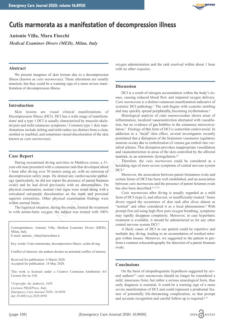



59 - Decompression illness treated at the Geneva hyperbaric facility
2010–2016: A retrospective analysis of local cases.
Author: Julian Thaler, Rodrigue Pignel, Marie-Anne
Magnan, Michel Pellegrini, Pierre Louge
This document discusses a study of patients treated with
hyperbaric oxygen for DCI from 2010 to 2016, analyzing
data for case descriptions and factors linked to negative
outcomes. Severe DCI had high rates of lasting deficits,
but no single factor predicted a bad outcome. A
Boussuges score over 7 predicted an unfavourable
outcome in spinal DCI with 90% sensitivity and 53%
positive predictive value.












